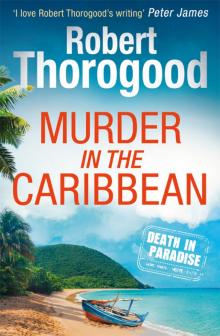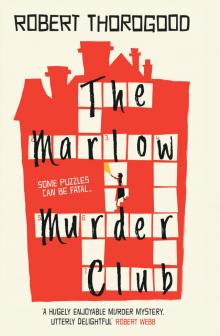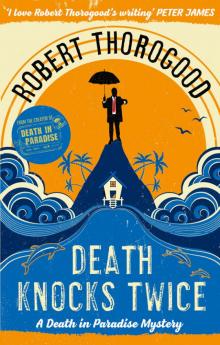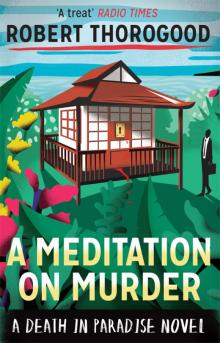- Home
- Robert Thorogood
The Marlow Murder Club Page 5
The Marlow Murder Club Read online
Page 5
‘Can you rewind to show Elliot leaving?’
Becks rewound the footage, Elliot and his friends walking backwards into the frame.
‘Can you replay it from there?’ Judith asked.
Becks pressed play and Elliot and his friends started to walk down the aisle again.
This time, both Judith and Becks saw it.
Just before he disappeared from view, Elliot looked directly into the lens of the camera. But almost as soon as he’d looked, he turned and clapped one of his friends on the back, the men all leaving, chatting happily together.
‘He looked at the camera,’ Becks said.
‘He did, didn’t he? He knew it was there.’
‘I suppose he’s had years to notice it. Maybe it’s a coincidence?’
‘I don’t think so. You saw it too, didn’t you? That look on his face.’
Becks bit her lip. It was true. She’d seen it as well.
‘It’s like he knew someone would watch the footage. To check up on his alibi. And for a split second his ego took over and he couldn’t help himself. He had to look at the camera.’
‘But how would you describe that look on his face?’
‘I know exactly how I’d describe it,’ Judith said. ‘It was a look of triumph.’
The women looked at each other. They both knew that Judith had hit the nail on the head. Elliot had looked at the camera triumphantly.
Becks shivered.
‘Sorry, these old stone buildings. Even in the height of summer, they’re cold.’
‘Okay,’ Judith said, ‘so what’s our next move?’
‘I’m sorry?’
‘That footage proves he can’t be the killer, but he’s definitely involved in Stefan’s murder. Somehow he managed to be in two places at once. Or he hired someone else to do the killing. But that look he gave to the camera proves his guilt as far as I’m concerned. Don’t you think?’
‘Hang on, what do you mean “what’s our next move”?’
‘Well, we’re the only two people in the world who currently believe Elliot’s implicated in any way in Stefan’s murder. So it’s up to us to work out how he did it.’
‘Oh no, I couldn’t possibly get involved,’ Becks said. ‘This is a matter for the police. We have to let them do their job. That’s what they do. Catch criminals and murderers. Whereas I make sandwiches, that’s my job. I serve tea and biscuits, raise my kids, and help my husband. So I’m sorry, it’s been lovely meeting you, Judith, but I couldn’t possibly get involved.’
And with that, Becks left the room, all of a twitter.
Judith smiled to herself. She remembered being that young. Not neurotic like Becks, or desperately worried about what people thought of her. But, in her book, anyone who could pick up a couple of coffee cups, and a few short minutes later find herself hiding inside a cupboard, was okay by her. She looked forward to meeting Becks again.
In the meantime, though, how could she prove Elliot was involved?
Chapter 7
After her encounter with Judith, Becks hurried back to the vicarage, a gorgeous bow-fronted Georgian house to the side of the church, but she found she couldn’t settle. Her second-hand brush with a possible murder had upset her more than she’d like to admit. So, to calm her nerves, she did what she always did when she felt anxious, and that was tidy up. She plumped cushions that were already plump, straightened pictures on the walls that weren’t askew, and ran a hoover over a kitchen floor that was entirely dirt-free.
Her fourteen-year-old son Sam was slumped over his phone at the kitchen table.
‘Where’s your sister?’ Becks asked.
‘I don’t know,’ Sam said without looking up. ‘Probably snorting nitrous oxide somewhere.’
‘Don’t say that!’ Becks yelped.
Although Sam was joking, both he and his mum knew that while Sam was a high-achieving student who liked to follow the rules, his sixteen-year-old sister Chloe was very much the opposite. All she wanted was to hang out with her friends and party. But then, in her moments of honesty, Becks knew that Chloe wasn’t doing anything that she hadn’t done at the same age, it’s just that her behaviour worried her sick.
Not that she really understood Sam, either. In the last year or so he’d become increasingly withdrawn, and as far as Becks could see, the only meaningful social interactions he had outside of school hours were with his hamster, who he doted on.
‘You look lovely, darling,’ the Reverend Colin Starling said as he entered the room wearing his black suit, bib and white collar.
‘How can you say that?’ Becks snapped. ‘These are my yoga clothes.’
Exasperated with her husband’s lack of sensitivity, Becks went upstairs to get changed. At some deep level she knew she’d behaved unreasonably, but she couldn’t shake her feeling of unease.
In the bedroom, she grabbed up her mobile phone to see if Chloe had been in touch. She hadn’t.
‘Becks?’ Colin called up from the bottom of the stairs. ‘You remember we’re having Major Tom Lewis and his wife over for dinner?’
Becks didn’t even bother to respond. Of course she knew they had guests for dinner. She’d been up at six that morning rubbing fennel into a belly of pork so it could have the full ten hours in the slow cooker. Even though Major Tom would be drunk before he arrived, and Mrs Lewis would criticise her by a whole set of criteria she’d only reveal once Becks had failed to meet them.
Becks couldn’t help thinking to herself, where had she gone wrong in her life? It wasn’t that she was unhappy. Far from it. But she wasn’t happy, either. Colin had been a banker when they’d first met, and although they’d both been regular churchgoers, he’d not expressed any interest in the ministry before they’d got married. It was only after Chloe was born that he began to have ‘doubts’ about all the lovely money he was making. And then, right after Sam’s arrival, when their need for money had spiralled, he’d had his ‘calling’. Being a good wife, Becks had supported her husband in his radical change of career from rich banker to country vicar.
And here she was, all these years later, a homemaker, a wife, and a mother. All wonderful roles, and she kept telling herself she was lucky her life was so blessed, but she couldn’t help noticing that everything about her existence seemed to be defined by someone who wasn’t her. She was the kids’ mum, the vicar’s wife, and the house’s wife for that matter.
Becks opened a social media app on her phone. She was looking for a community group she’d joined not long after her husband had been made vicar of Marlow. The group was called Let’s Talk Marlow. When Becks had joined, she’d not used her real name. She’d used the moniker ‘Jezebel’. This anonymity had allowed her to be a bit more loose-lipped online than she’d ever be in real life. But she’d made herself give up on the site a few years ago. It had been altogether too intoxicating having an alter ego, and she knew it wasn’t healthy, especially when she suspected she liked her alter ego more than she did her real self.
For the first time in a long while she went to the forum. A quick scan of the live threads told her it was still mostly preoccupied with the fear of travellers moving into Seymour Park, and the refusal of people to pick up dog poo. So, no change there.
Becks started a new thread.
I’ve got some old furniture I want to sell. I’d like to use the Marlow Auction House, but I’ve heard some bad things about the owner, Elliot Howard. Can he be trusted?
Her finger hovered over the ‘Post’ button. Could she really be so daring? By day, mild-mannered vicar’s wife, but by teatime an anonymous cyber warrior?
Before she could stop herself, Becks pressed the button and the post went live.
A joyous thrill ran through her. She couldn’t remember the last time she’d been so daring.
The following morning, Judith was sitting at her desk struggling to find a satisfying crossword clue for the word ‘shoulder’. She’d recently noticed that it could be constructed from the conditional word �
�should’ and the hesitation of ‘er’. The difference in pronunciation between the two ‘shoulds’ pleased her enormously, and her instincts told her there was a satisfying link to be made between being unsure – ‘er’ – after having an obligation – ‘should’. But every time she tried to focus on how best to phrase a clue, the image of Elliot Howard popped into her head: how self-assured he’d been when he met her; how smug he’d looked as he’d glanced at the CCTV camera in the church.
And if Elliot wasn’t ruining her concentration enough, Judith also couldn’t stop thinking about poor old Stefan. She found herself remembering the only face-to-face conversation they’d ever had. It had been a few winters ago, when the country had been blanketed in snow and Stefan had appeared at Judith’s door to check that she was okay. Stefan hadn’t known that the whole drama of getting in supplies and making sure she had enough wood for her fire had been galvanising Judith for days. What’s more, he’d not been nosy or judgemental about Judith’s solitary life, the way most people seemed to be. And he’d not tried to get inside to see what her mansion looked like. Most casual callers were desperate to see if the interior of her house matched the grand exterior. But not Stefan. He’d been respectful, polite, and as soon as he’d seen that Judith was well-prepared for the coming snow, he had bidden her good day and left.
A good man, that’s what he was, Judith thought to herself, and, for the hundredth time that morning, she found herself idly looking out of her window towards her neighbour’s empty house.
There was a woman standing in Stefan’s garden.
It took Judith a few moments to process what she was seeing.
There was a woman standing in Stefan’s garden!
Judith jumped up, pencils clattering to the floor, strode over to her front door, threw her cape around her shoulders and dashed outside. Who was she? What was she doing at Stefan’s house?
Marching through the thick grass of her garden, Judith stopped at the river’s edge. The woman was standing on Stefan’s lawn, turning slowly on the spot. It was as if she was trying to get a sense of where she was. She wore jeans and a dark T-shirt, and had a thick head of auburn hair. It was wild-looking and a bright copper colour. Like a pre-Raphaelite painting, Judith found herself thinking.
‘Hello!’ Judith called out from her garden.
The woman turned at the sound of Judith’s voice.
‘Hello!’ Judith called out again. ‘I’m Judith Potts, Stefan’s neighbour. Can I help you?’
Judith’s eyes weren’t quite what they’d once been, so it was hard for her to make out the woman’s features clearly, but she was pretty sure the woman looked panicked by her sudden appearance. And then all doubt was removed as the auburn-haired woman turned and all but ran away.
‘I only wanted to say hello!’ Judith called after her, but it was too late. The woman had vanished around the side of Stefan’s house.
Chapter 8
DS Tanika Malik was reading the ballistics report on Stefan Dunwoody’s death when an officer rang through to tell her that a woman called Mrs Judith Potts was waiting in the reception area for her. DS Malik was briefly puzzled, but told the officer to take Mrs Potts to a meeting room and tell her she’d join her in a few minutes. There was a very pressing matter she needed to deal with first.
She picked up her phone and dialled the number at the top of the report.
‘Are you saying the bullet that killed Mr Dunwoody was an antique?’ she asked the forensic officer as soon as she was put through.
‘That’s right,’ the woman on the other end of the line said.
‘Are you sure?’
‘The bullet we retrieved from Mr Dunwoody’s skull was a 7.65 millimetres by 21 millimetre parabellum, and that’s a very specific size that was only used up until the Second World War by the German armed forces.’
‘Are you serious?’
‘I’m afraid so. It was fired from a Second World War German Luger pistol.’
‘And that would work, would it? A seventy-year-old bullet?’
‘The Germans knew how to make pistols. Still do. Sure it would work.’
DS Malik thanked the officer for her help and hung up the call. One of the truisms of policing in the UK was how hard it was to lay your hands on a working handgun. It was just as hard to get hold of an antique gun that hadn’t been decommissioned.
Unless you were an antique dealer, perhaps?
After her second conversation with Judith, DS Malik had rung Elliot Howard to follow up on her tip-off. Elliot had happily admitted that he had indeed had an argument with Stefan at the Henley Royal Regatta, but it had only been because Stefan was blocking his view. And although it had got rather heated, it had been six weeks ago, so it was all water under the bridge.
As for his movements on the night Stefan died, DS Malik knew that the pathologist’s report had concluded that Stefan had been shot sometime between 7 p.m. and 10 p.m., so she’d asked Elliot where he’d been between those hours. He’d explained that he’d been at choir practice at All Saints’ Church, then gone to the pub for a pint afterwards, and he hadn’t left the pub until around 10 p.m.
DS Malik hadn’t much liked Elliot’s manner. He’d seemed too smooth, almost as if he’d been expecting her phone call and had prepared for it. In her experience, members of the public got flustered when they became part of an investigation, especially when it was to do with a possible murder. But a quick call to the vicar in Marlow confirmed Elliot’s story. In fact, the vicar said that he’d gone to the pub with Elliot after choir practice as well, so he was able to say that he’d been in the same room as Elliot between the hours of seven and ten. And seeing as Elliot’s alibi was the local vicar, DS Malik hadn’t taken things any further.
But now she’d learned the murder weapon was an antique German pistol, was it perhaps worth revisiting him? Or was it just a coincidence? DS Malik tried to shake the thought. Stefan Dunwoody had taken his own life, it was the only thing that made sense. Even if he’d used an old pistol to do it.
Although, DS Malik thought to herself, there was still the mystery of the bronze medallion, wasn’t there?
This was previously the only aspect of the case that had given DS Malik pause. When the divers had fished Stefan’s body out of the river, they’d found a small medallion about the size of a two-pound coin attached by a silver chain to a buttonhole on Stefan’s jacket. The medallion was clearly very old, a dull brown in colour, with a swirling pattern of leaves carved around the edge of it and the word ‘Faith’ carved across the middle. It was something of an anomaly, if only because none of her team had come across a medallion attached to a jacket like that before.
But an old religious symbol was hardly the sort of evidence they could use to build a murder case. Any more than they could use an antique German Luger.
On her way to see Judith, DS Malik stopped briefly at one of her constables’ desks.
‘Have we found the gun yet?’
‘Not yet,’ the officer replied. ‘The divers completed their fingertip search of the riverbed this morning. They didn’t find it.’
‘Then what about in the pond?’
One of DS Malik’s working theories was that Stefan had perhaps stood on the brick dam that separated his pond from the river, shot himself in the head, and had then fallen backwards into the river while his gun had fallen forward into the pond.
‘They’ve looked on the pond side of the wall as well. No gun.’
‘They’re sure about that?’
‘They can’t be one hundred per cent sure. Not unless we dredge the pond and river properly.’
‘It may have to come to that.’
It was a very thoughtful DS Malik who finally met up with Judith.
‘I’m sorry I kept you waiting,’ DS Malik said as she sat down in the meeting room.
‘Don’t worry,’ Judith said. ‘I know you must be very busy. I won’t take up any more of your time than I have to. But I’ve found a few things out and I thi
nk you should know. As a matter of some urgency.’
‘Okay,’ DS Malik said, getting out a notebook and pen. ‘What do you want to tell me?’
Judith explained how she’d gone to Stefan’s gallery and learned from his assistant Antonia Webster that Elliot Howard had visited Stefan at the beginning of the week before he’d died, that they’d had an argument, and that Antonia had heard Stefan tell Elliot that he had enough to go to the police.
DS Malik was surprised. Just as she’d ruled Elliot out from her enquiries, here he was popping up again.
‘Mr Dunwoody said that, did he?’ DS Malik asked.
‘“I’ve got enough to go to the police.” Those were his exact words to Elliot. According to Antonia. And later on, when Antonia spoke to Stefan about it, he said “desperation drives people to do stupid things”.’
‘He was suggesting that Elliot was desperate?’
‘That’s it exactly!’
‘Although, what if he was referring to himself? Seeing as he possibly took his own life. His “desperation drives people to do stupid things” could have been a veiled reference that he was about to commit suicide.’
Judith threw her hands up in exasperation.
‘You don’t still believe it was suicide, do you?’
‘It’s a possible explanation.’
‘I bet there wasn’t a suicide note, was there?’
DS Malik frowned. The truth was, Judith was right. They’d found no suicide note on Stefan’s body. Or in his house.
Thinking of Stefan’s body reminded DS Malik of the bronze medallion they’d found, so she decided to do a bit of digging.
‘Would you say Mr Dunwoody was a religious man?’
‘I’m sorry?’
DS Malik explained how they’d found a medallion with the word ‘Faith’ carved into it attached to Stefan’s jacket.
‘You mean he wore it like a badge?’
‘Yes. Something like that.’
‘How was it attached to his jacket?’
‘It was on a short chain looped through the middle buttonhole on his jacket.’

 Murder in the Caribbean
Murder in the Caribbean The Marlow Murder Club
The Marlow Murder Club Death Knocks Twice
Death Knocks Twice A Meditation on Murder
A Meditation on Murder Killing Of Polly Carter
Killing Of Polly Carter